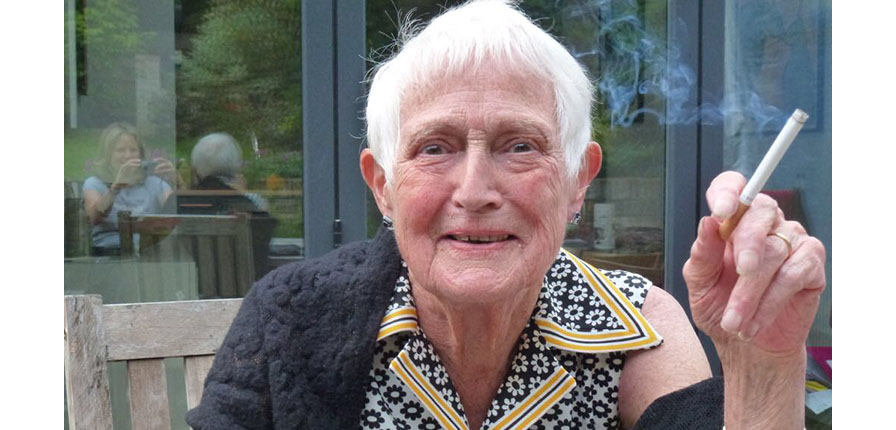Joyce Marlow: an obituary

Joyce Marlow, who died last November aged 87, was a founder member of ALCS, a prominent member of the Writers’ Action Group for PLR and a member of the working party of publishers and authors which led to the creation of the Copyright Licensing Agency.
Joyce was born in Manchester of radical, Unitarian stock and from an early age had two ambitions – to be an actress or a writer. During her time at Whalley Range High School, she gained an abiding love of history, aiming to study the subject at Oxford. However, realising that no-one from the school had ever got to an Oxbridge college, she shocked her mother by walking out of the sixth form after a couple of weeks, saying ‘Only Oxford would do’. Her next move was to become an actress, winning a place at the newly established Bradford Civic Theatre School. There followed what might now be seen as a slightly bohemian time working in weekly and twice-weekly rep, criss-crossing the country by train on Sundays. She then moved to London and appeared in various TV series throughout the 1950s and 60s, including Dixon of Dock Green, Z Cars and the comedy series A Little Big Business with David Kossoff and Francis Matthews. When ‘resting’, she worked in the Savoy Hotel Press Office and had spells as Press Officer to Bill Haley during his UK tour in the mid-50s, and for Burl Ives the following year. Joyce’s goal was always to reach the top of whatever tree she was climbing and, eventually realising that she had probably reached her optimum level in acting, she decided to move on to her other love – writing.
Her children’s books, The House on the Cliffs and The Man with the Glove were followed by an adult novel, A Time to Die, and two pictorial history books for publisher George Weidenfeld, The Kings and Queens of England and George II. Possibly her most satisfying work came in writing 19th century social history books for the non-academic reader – The Tolpuddle Martyrs, Mr and Mrs Gladstone, The Uncrowned Queen of Ireland and, most notably, The Peterloo Massacre, all of which were both popular and critically very well-received. However, by the 1980s interest in the type of history books Joyce had been writing waned, and she moved on to historical novels with a trilogy about the women’s suffrage movement and the First World War. Kessie, the first and most popular of the trilogy received ‘Runner-up and Elizabeth Goudge Historical Trophy’ in the Romantic Novelists’ Association award ceremony, 1986 – which both pleased and amused her as she had not thought of the subject as being ‘romantic’.
From childhood, Joyce had always liked to be involved in action or causes and in the 1970s as a member of the Writers’ Guild she became involved in the Writers’ Action Group (WAG) which had been set up to campaign for a loan-based government-funded Public Lending Right (PLR) paid to authors, not publishers (the full story of WAG can be read in the ALCS Story 1977-1997, authored by Joyce). By 1977, the then named Authors’ Lending and Copyright Society (ALCS) was incorporated with seven WAG members agreeing to be the signatory committee members of the Society, one of whom was Joyce. She was two years on the working party which resulted in the formation of the Copyright Licensing Agency (CLA), a committee member of the Executive of ALCS representing the Writer’s Guild, and an author representative member of the Advisory Committee of PLR. Later on, she also joined the Society of Authors.
In the late 1980s, Joyce moved back north, to New Mills, and, as perceptions of how a novel developed – no longer linear in time with a beginning, middle and end – she found it hard to adapt, so changed again to edit books on women’s writings: Women and the First World War and Votes for Women: The Virago Book of Suffragettes, which, when the film The Suffragette came out in 2015, was re-published in paperback. On two occasions she was joined by Glenda Jackson, whom she had met while still acting, in readings from the books at the Imperial War Museum and the National Portrait Gallery.
Just before she died, Joyce had the satisfaction of learning from film director Mike Leigh that her book The Peterloo Massacre was one of the sources that had inspired him to make his forthcoming feature film on the subject. I understand also, that The Peterloo Massacre is to be re-published some time next year. A sort of posthumous recognition which would have pleased her.
Janet Hurrell, Secretary General of ALCS 1984-1996.
